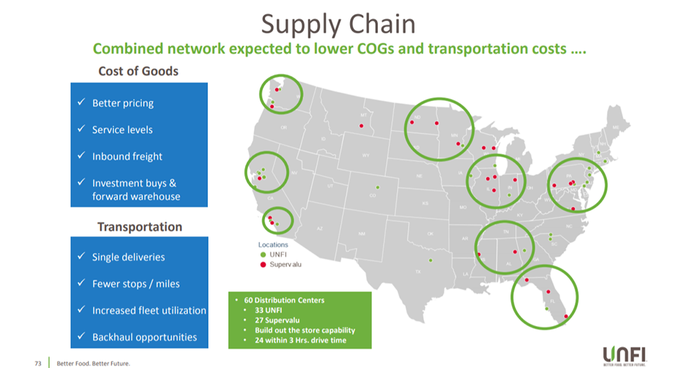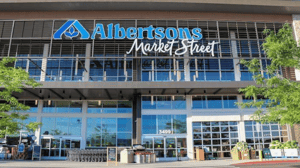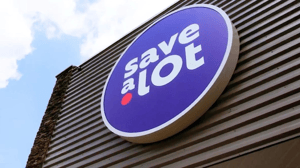Upbeat Outlook Lifts UNFI/SupervaluUpbeat Outlook Lifts UNFI/Supervalu
Financial projections awaken stock interest; deal for Shoppers Food coming soon. In an investor presentation, officials detailed a “once-in-a-lifetime” opportunity and said a deal for Shoppers Food is near.
Officials of United Natural Foods Inc. spoke for more than three hours about their vision for the company now that it has acquired its conventional rival, Supervalu. Two hours in, its stock was up by nearly 30%.
Needless to say, investors were pleased with what they heard, with many appearing to rejoin a stock they’d abandoned late last year amid questions as to the company’s financial outlook and its plans for digesting the $2.9 billion acquisition of its larger rival.
“They made a very credible case that there is value in buying Supervalu,” analyst Andrew Wolf of Loop Capital, Chicago, told WGB. “Financially, they were very bullish relative to expectations.”
During the presentation, held Jan. 16 in Orlando, UNFI officials provided investors the reassurance they needed, projecting compound annual sales growth of 3.6% and EBITDA (earnings before interest, taxes, depreciation and amortization) growth of 7% through fiscal 2022, and reiterating expectations that the Supervalu deal would reel off more than $185 million in synergies over that period. UNFI also revealed plans to reduce its debt leverage by more than half over that period.
Enabling all that will be what UNFI CEO Steve Spinner described as the nation’s most diversified wholesale food distributor, capable of providing retail customers with conventional, natural/organic and specialty products, as well as fresh foods, deli and private brands, along with the capability of delivering services for customers nearly anywhere in the U.S. This, Spinner said, will be vital for retailers as competitive and cost pressures will increasingly favor scale as the natural and conventional worlds further converge, positioning the new UNFI to lead the change.
“We have a once-in-a-lifetime opportunity to build a big, profitable, transformational company,” Spinner said. “There are not a lot of times in your career when you can do something this transformational as this … and have this kind of positive influence. I think for the most part, it’s going to be fun.”

Graphic courtesy of UNFI
Highlights of the presentation included:
An update on progress toward selling off Supervalu’s remaining retail chains. Spinner said the company was “very far down the road” toward a deal to sell the Lanham, Md.-based Shoppers Food division, anticipating a late spring/early summer announcement. The Stillwater, Minn.-based Cub Foods chain remains on the block, but Spinner said he hopes to find a buyer for it by the end of the year.
CFO Mike Zechmeister shared financial, debt and synergy projections mentioned above, saying the company expects sales of $21.5 billion to $22 billion this fiscal year growing to a range of $27 billion to $27.5 billion by fiscal 2022. EBITDA is projected to climb from $657.5 million this year to $875 million to $925 million in 2022. He expected capital expenditures of 1.3% to 1.5% of sales this year (roughly $280 million to $330 million) before lowering that rate to 1% of sales in future years. Free cash flow is expected to be neutral to modestly positive, not including any proceeds from divestitures, which include both retail stores and real estate that will be set free as the company rationalizes its 60 distribution centers.
Sean Griffin, CEO of Supervalu, detailed how the company was looking at synergies, saying the first $36 million would be realized this fiscal year—half of it through labor. He acknowledged Supervalu was dealing with inefficiencies related to ongoing integration of its pre-UNFI acquisitions but emphasized those issues were “fixable” while envisioning a “one company” mesh with UNFI, including a standard platform and common processes.
UNFI President Chris Testa highlighted cross-selling opportunities the merger created, noting that Supervalu’s conventional stores could tap in to 7.1% growth in natural and organic foods, while the natural food stores supplied by UNFI can better access conventional products such as cleaning products and alcohol. Testa also said the company would adopt Supervalu’s service offerings for all its retail customers, including things such as financial statements, payroll and payment processing.
Anne Dament, EVP of retail, marking and exclusive brands, highlighted what she called an industry leading brand portfolio to be made available to all retail customers, noting that stores affiliated with private brands were 15% more profitable than those that were not. She said the company would “invest in the brands that have the best potential for growth” and complement one another’s strengths. For example, she noted, UNFI’s 150-item Field Day brand could benefit from its larger counterpart at Supervalu, the 650-item Wild Harvest line.
Mario Adamy, VP of warehouse and automation, detailed plans to consolidate distribution, saying the combined and optimized supply chain would lower costs for goods, transportation and operations. The plan involves consolidating distribution centers based on sales velocity. In the Pacific Northwest, for example, UNFI will reduce its current five warehouses to just two—one each for fast- and slower-moving items.
Wolf acknowledged that realizing UNFI’s ambitions would require “a lot of execution,” but added, “this isn’t the gang that couldn’t shoot straight. UNFI going back 10 years has proven they can do things like this.”
Chris Mandeville, an analyst with Jefferies, New York, was more circumspect. In a note to clients, Mandeville advised investors to wait and see how execution commences, and noted in his opinion that Supervalu was “in complete disarray,” with underwhelming projections for sales growth and remaining questions about margin stability.
About the Author
You May Also Like






